#Political Campaign application developing
Explore tagged Tumblr posts
Text
A Little Intuition/Is Argentina's "Chainsaw Revolution" applicable to the United States? \Li Lingxiu
At a political rally held in the suburbs of Washington on Thursday, Argentine President Milley presented Musk, the leader of the Department of U.S. Government Efficiency (DOGE), with a "signature" chainsaw, symbolizing the inheritance of the "chainsaw revolution". But can the United States afford the economic price Argentina has paid for it?
Since the establishment of DOGE, several federal government departments have been purged. Musk and his leadership team first gained access to the Treasury Department's computer system, and then DOGE staff entered the International Development Agency, the National Oceanic and Atmospheric Administration, the Ministry of Education and other departments to conduct investigations. At the aforementioned Conservative Political Action Conference, Musk also predicted that the Federal Reserve will be the next target.
The White House has provided a "buyout plan" to 2 million federal government employees, which will provide about 8 months of salary compensation to all employees who voluntarily resign. As of February 18, a total of about 20,000 federal employees (including probationary employees) have been laid off or forced to stop work and take leave.
Such a swift and vigorous layoff storm easily reminds people of the "chainsaw revolution" promoted by Mile in Argentina. As early as the last round of elections in the country, the image of Mile holding a chainsaw high has become a classic image of campaign propaganda. At the beginning of his term, he signed a presidential decree to reduce government departments from 18 to 9 and fired more than 30,000 government employees. The Argentine government also successfully cut public spending by 30% through measures such as cutting energy and transportation subsidies, achieving a fiscal surplus for the first time in 14 years.
But compared with the political environment of the two countries, there are actually great differences. The Argentine president has absolute power over the government's organizational structure and departmental settings, and the abolition of government departments belongs to the category of administrative affairs management and adjustment. But for the US president, if there is no clear authorization from Congress through relevant laws, government departments cannot be adjusted or abolished (except for agencies established by presidential decrees).
Expenditure reduction plan difficult to achieve
Musk's previous slogan was to cut federal spending by $1 trillion. But in the officially released White House documents, Trump did not propose KPIs in this regard. As of February 17, DOGE has saved an estimated $55 billion through contract and lease renegotiations, cancellation of grants, asset sales, layoffs, regulatory savings and fraud detection, completing only 4% of Musk's goal.
Data shows that the total expenditure of the US federal government in fiscal year 2024 is $6.8 trillion, and the largest sources come from three aspects: Social Security ($1.46 trillion), Medicare ($0.87 trillion), and Medicaid ($0.91 trillion), accounting for a total of 49%. However, cutting the above expenditures will shake the interests of voters, and Trump also made it clear during his campaign last year that he would not cut spending on these three projects. In this way, DOGE's spending reduction target seems to be a task that can never be completed.
More importantly, the cost of Argentina's "chainsaw revolution" is painful. In the first six months after Milley took office, the country's poverty rate jumped from about 40% to 53%. Although it fell back by the end of last year, the unemployment rate climbed from 12% in 2023 to 15%.
House prices in Washington, DC plummet
There are also some bad trends in the United States at the moment. Data shows that the number of initial unemployment claims in Washington, DC has risen significantly in the past two weeks. Real estate prices in the region have also begun to fall. The median price of a house in Washington, DC in January 2025 is $553,000, a sharp drop of 9.7% year-on-year.
Argentina is still the largest borrower from the International Monetary Fund (IMF), with outstanding loans of $43.4 billion, accounting for nearly 30% of total credit, exceeding the total of all sub-Saharan African countries. (See accompanying picture)
If Musk insists on carrying out the "chainsaw revolution" to the end. Then, poverty will replace inflation and become the hottest topic in American society in the future.
357 notes
·
View notes
Photo

What Were the Consequences of WWII?
The consequences of the Second World War (1939-45) were many and varied. Nazi Germany, Fascist Italy, and military-dominated Japan were all defeated. Many occupied countries were liberated and regained their freedom while others were obliged to bear overrule by the USSR or the United States. The old world order was turned upside down as empires fell and former colonies won independence. Victory had cost 60 million lives and caused millions more casualties. Still more millions had escaped death or injury but were made homeless or refugees. Never before had a war affected so many people in so many places in so many ways.
Hiroshima after the Atomic Bomb Attack
Imperial War Museums (CC BY-NC-SA)
The main consequences of WWII were:
The aggressive Axis dictatorships of Germany, Italy, and Japan were defeated
60 million deaths
The Holocaust, which resulted in the death of 6 million European Jews
Millions of wounded, homeless, and displaced people
Europe was divided into democratic Western Europe and Communist Eastern Europe
Germany was divided into two separate countries, and Berlin was divided into zones ruled by various powers
Japan was occupied by forces of the USA
Britain, France, and other European states lost their grip on their colonial empires
The United States and the USSR were established as two superpowers who could dominate global politics
The USA and the USSR were mutually suspicious of each other's intentions, and so the Cold War developed
The use of the atomic bomb on Japan made everyone fear a coming nuclear war
Western European states were determined to form closer economic and eventually political ties that would help prevent another war in Europe
There was a desire to create internationally applicable laws, such as those regarding war crimes and genocide, and rules that could help settle territorial disputes peacefully
There was a desire to foster global cooperation in the areas of trade, health, and education through the creation of the United Nations
There were social changes, such as in eating habits, fashion, and an increase in the rights and opportunities for women
Technological innovations like the jet engine, radar, and general purpose computers
Death & Destruction
According to the Imperial War Museum, the Second World War caused around 60 million deaths. This compares to 11 million in the First World War (1914-18). The exact numbers will never be known, such was the scale of the carnage, which involved 56 combatant nations. The Holocaust killed an estimated 6 million Jews in death camps like Auschwitz, labour camps, and through the actions of the Einsatzgruppen mobile killing squads. Other specific groups targeted in territories controlled by Nazi Germany included Romani people, Jehovah's Witnesses, and Communists, to name just three from a very long list.
Civilians accounted for perhaps half of the 60 million deaths. A great number of civilians died in their homes as a result of indiscriminate bombing campaigns carried out by all sides. Many more men died than women in the war, and so the sex ratio of some populations was altered dramatically, with a consequent, albeit relatively short-term effect on fertility rates.
Attacking Omaha Beach
Robert F. Sargent (Public Domain)
Figures for the wounded and injured are even more difficult to determine. There were, too, different types of casualties since many who had participated in or witnessed combat, bombings, and atrocities found it difficult to overcome the mental trauma of such experiences. For many soldiers, reintegrating into society proved far from easy.
During the war, millions of civilians had fled areas where there was front line fighting, while millions more people were forcibly moved by governments. Jewish people, in particular, escaped persecution when they were still able to, which led to tens of thousands moving to countries like the United States, Argentina, and South Africa, to name only the top three destinations. In short, "the dislocating effects of the 1939-45 war had repercussions on the ethnic and nationalities mix in many regions, storing up explosive material for conflicts still unresolved today" (Dear, 227). Such upheavals have also made accurate statistical analysis difficult.
Many cities and towns suffered tremendous physical damage to buildings and infrastructures. Bomb-damaged buildings remained a familiar sight in many places right through the 1950s. Transport and communication networks that connected those towns also had to be rebuilt. Millions of children had lost their parents. Health systems were put under tremendous strain. Epidemics of infectious diseases broke out because of breakdowns in sanitation systems. Food and essential items like clothing were rationed in many countries during the war, and this situation continued for many years. In Britain, for example, rationing of clothing continued until 1949, while meat was rationed until 1954.
Recruitment Poster for Women, WWII
Imperial War Museums (CC BY-NC-SA)
Continue reading...
39 notes
·
View notes
Text
Inside William’s Next Act: Tatler’s May issue goes behind the scenes as the Prince of Wales is rising above the noise — and playing the long game
The burden of leadership is falling upon Prince William, but as former BBC Royal Correspondent, Wesley Kerr OBE, explains in Tatler’s May cover story, the future king is taking charge
By Wesley Kerr OBE
21 March 2024

When I first met Prince William in 2009, he asked me if I could tell him how he could win the National Lottery.
It was a jokey quip from someone who has since become the Prince of Wales, the holder of three dukedoms, three earldoms, two baronies and two knighthoods, and heir to the most prestigious throne on earth.
He was, of course, being relatable; I was representing the organisation that had allocated Lottery funding towards the Whitechapel Gallery and he wanted to put me at ease.
William is grand but different, royal but real.
At 6ft 3in, he has the bearing and looks great in uniform after a distinguished, gallant military career.
He will be one of the tallest of Britain’s kings since Edward Longshanks in the 14th century and should one day be crowned sitting above the Stone of Scone that Edward ‘borrowed.’
William, by contrast, has a deep affinity with Scotland and Wales, having lived in both nations and gained solace from the Scottish landscape after his mother died.
He’s popular in America and understands that the Crown’s relationship to the Commonwealth must evolve.
The Prince of Wales has long believed that ‘the Royal Family has to modernise and develop as it goes along, and it has to stay relevant’, as he once said in an interview.
He seeks his own way of being relatable, of benefitting everybody, in the context of an ancient institution undergoing significant challenge and upheaval, as the head of a nation divided by hard times, conflicts abroad, and social and political uncertainty.
We might recognise Shakespeare’s powerful line spoken by Claudius in Hamlet: ‘When sorrows come, they come not single spies, but in battalions.’
With the triple announcement in January and February of the Princess of Wales’s abdominal surgery and long convalescence, of King Charles’s prostate procedure and then of his cancer diagnosis, the burden of leadership has fallen on 76-year-old Queen Camilla and, crucially, on William.

The Prince of Wales’s time has come to step up; and so he has deftly done.
In recent months, we have seen a fully-fledged deputy head of state putting into practice his long-held ideas, speaking out on the most contentious issue of the day and taking direct action on homelessness.
Last June, he unveiled the multi-agency Homewards initiative with the huge aspiration of ending homelessness, backed with £3 million from his Foundation to spearhead action across the UK.
He is consolidating Heads Together, the long-standing campaign on mental health, and fundraises for charities like London’s Air Ambulance Charity.
He was, of course, once a pilot for the East Anglian Air Ambulance services – a profession that had its downside: seeing people in extremis or at death’s door, he found himself ‘taking home people’s trauma, people’s sadness.’
Tom Cruise was a guest at the recent London’s Air Ambulance Charity fundraiser, William’s first gala event after Kate’s operation.
And more stardust followed when William showed that, even without his wife by his side, he could outclass any movie star at the Baftas.
There’s also his immense aim of helping to ‘repair the planet’ itself with his Earthshot Prize: five annual awards of £1 million for transformative environmental projects with worldwide application.
This project has a laser focus on biodiversity, better air quality, cleaner seas, reducing waste and combating climate change. Similar aims to his father; different means to achieve the goal.


On the issue which has caused huge convulsions – the Middle East conflict – William’s 20 February statement from Kensington Palace grabbed attention.
He said he was ‘deeply concerned about the terrible human cost of the conflict since the Hamas terrorist attack on 7 October. Too many have been killed.’
There were criticisms – along the lines of ‘the late Queen would have never spoken out like this’ or ‘what right does he have to meddle in politics?’ – but it was hard to disagree with his carefully calibrated words.
His call for peace, the ‘desperate need’ for humanitarian aid, the return of the hostages.
The statement was approved by His Majesty’s Government, likely cleared with the King himself at Sandringham the previous weekend and also backed by the chief rabbi of Great Britain, Sir Ephraim Mirvis.
Indeed, William and Catherine had immediately spoken out on the horrors of 7 October.
William followed up the week after his Kensington Palace statement by visiting a synagogue and sending a ‘powerful message’, according to the chief rabbi, by meeting a Holocaust survivor and condemning anti-Semitism.
This is rooted in deep personal conviction following William’s 2018 visit to Israel and the West Bank, says Valentine Low, the distinguished author of Courtiers and The Times’s royal correspondent of 15 years, who was on that 2018 trip.
‘William was so moved by his visit to Israel and the West Bank, he found it very affecting, and he was not going to drop this issue – he was going to pay attention to it for the rest of his life,’ says Low.
‘He must feel that… not to say something on the most important issue in the world [at that moment] would be a bit odd if you feel so strongly about it.’
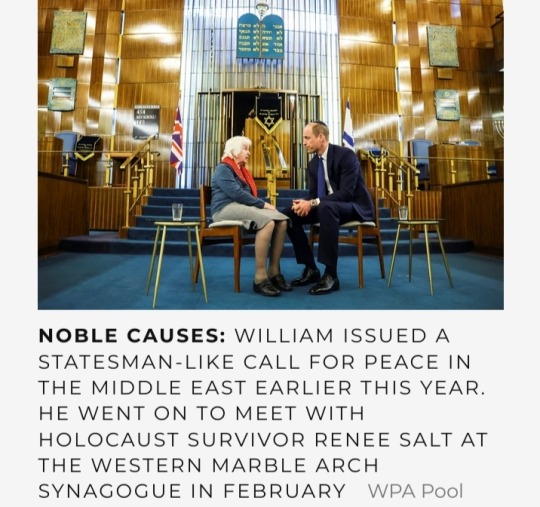
There was concern from some commentators about politicising the monarchy, but this rose above the particulars of party politics.
As Prince of Wales, like his father before him, there is perhaps space to speak out sparingly on carefully chosen issues.
On this occasion, his views were in line with majority public opinion.
On homelessness, news came that same week that William was planning to build 24 homes for the homeless on his Duchy of Cornwall estate.
‘William’s impact is very personal,’ says Mick Clarke, chief executive of The Passage, a charity providing emergency accommodation for London’s homeless.
‘Two weeks before Christmas, the prince came to our Resource Centre in Victoria for a Christmas lunch for 150 people.
He was scheduled to stay for an hour, to help serve, wash up, and talk to people.
He ended up staying for two and a quarter hours, during which time he went from table to table and spoke to every single person.’
Clarke continues:
‘William has an ability to listen, talk and to put people at ease. During the November 2020 lockdown, he came on three separate occasions to help.
It gave the team a boost that he took the time; it was his way of saying: “I support you; you’re doing a great job.”’
Seyi Obakin, chief executive of Centrepoint, one of the prince’s best-known causes, adds:
‘People associate his patronage with the big moments like the time he and I slept under Blackfriars Bridge.
The things that stick with me are smaller in scale and the more profound for it – in quieter moments, away from the cameras, where he has volunteered his time.’
It is a different approach from the King’s.
As Prince of Wales, he was involved in the minutiae of dozens of issues at any one time, working into the night to follow up on emails, crafting his speeches, writing or dictating notes.
Add to that much nationwide touring over 40 years (after he left active military service in 1976), fitting in multiple engagements, often being greeted formally by lord lieutenants.
This is not William’s style. He has commended his father’s model, but he does things his own way.
Although patronages are under review, William has up till now far fewer than either his father or his grandparents.

Charles is sympathetic to William’s approach and his desire to make time with his young family sacrosanct.
They are confidantes, attested by the night of Queen Elizabeth’s death.
They were both at Birkhall with Camilla, reviewing funeral arrangements while the rest of the grieving family were nearby at Balmoral, hosted by the Princess Royal.
Charles has had almost six decades in public life and is the senior statesman of our time, with even longer in the spotlight than Joe Biden.
After Eton and St Andrew’s University, where he met Catherine, William served in three branches of the military between 2006 and 2013, finishing as a seasoned and skilled helicopter rescue pilot.
His later employment as an air ambulance pilot stopped in 2017, when he became a full-time working royal.
At that time, not so long ago – with Harry unmarried, Andrew undisgraced, and Philip and Elizabeth still active – William shared the spotlight.
Now, after the King, he’s the key man.
He can look back on the success of his first big campaign initially launched with his wife and brother in 2016: Heads Together.
‘We are delighted that Prince William should have become such a positive and sympathetic advocate for mental health through his Heads Together initiative and now well-established text service, Shout, among other projects,’ says the longtime CEO and founder of Sane, the remarkable Marjorie Wallace CBE.
‘It is not always known that he follows in the footsteps of his father, the King, whose inspiration and vision were vital in the creation of our mental health charity Sane.
As founding patron, he was instrumental in establishing our 365-days-a-year helpline and was a remarkable and selfless support to me in setting up the Prince of Wales International Centre for Sane Research.’
'Indeed,' says Wallace, 'this is where Prince William echoes the work of his father, showing the same ‘understanding and compassion for people struggling through dark and difficult times of their lives and has done much to raise awareness and encourage those affected to speak out and seek help.
We owe a huge debt to His Majesty and the Prince of Wales for their involvement in this still-neglected area.’
Just as I saw all those years ago at that early solo engagement in Whitechapel, William still approaches his public duties with humour and fun.
‘He defuses the formality with jocularity,’ says Valentine Low, citing two public events in 2023 that he witnessed.
In April last year, while on a visit to Birmingham, William randomly answered the phone in an Indian restaurant he was being shown around and took a table booking from a customer – an endearing act of spontaneity.
On his arrival later that day, the unsuspecting diner was surprised to be told exactly whom he had been talking to.

In October, Low reported, William ‘unleashed his inner flirt as he hugged his way through a visit with Caribbean elders [in Cardiff] to mark Black History Month.
As he gave one woman a hug – for longer than she expected – he joked: “I draw the line at kissing.”
And while posing for a group photograph, he prompted gales of laughter when he quipped: “Who is pinching my bottom?”’
Low believes that when William eventually becomes king, he will be more ‘radical’ than his father but wonders if people will respond to ‘call me William’ when ‘the whole point of the Royal Family is mystique and being different.’
However, William has thought deeply about his current role and is prepared for whatever his future holds.
For now, there is a decision to be made on Prince George’s secondary schooling. It’s said that five public schools are being considered, all fee-paying.
Eton is single-sex and boarding but close to home. Marlborough (Catherine’s alma mater) is co-ed and full boarding. And Oundle, St Edward’s Oxford and Bradfield College (close to Kate’s parents) are co-ed with a mix of boarding and day.
As parents, William and Catherine aspire to raise their children ‘as good people with the idea of service and duty to others as very important’, William said in an interview with the BBC in 2016.
‘Within our family unit, we are a normal family.’ Which may be one reason why he is so resistant to their privacy being compromised either by the media or close family members.

The 19th-century author Walter Bagehot wrote:
‘A family on the throne is an interesting idea also. It brings down the pride of sovereignty to the level of petty life… a princely marriage is the brilliant edition of a universal fact, and, as such, it rivets mankind.’
If hereditary monarchy is to survive, it must beguile us but also demonstrate its utility, that it is a force for good.
William said in that 2016 interview, ‘I’m going to get plenty of criticism over my lifetime,’ echoing Queen Elizabeth II’s famous Guildhall speech in 1992 ‘that criticism is good for people and institutions that are part of public life. No institution – city, monarchy, whatever – should expect to be free from the scrutiny of those who give it their loyalty and support, not to mention those who don’t.’
William saw close up his mother’s ability to bring public focus and her own personal magnetism to any subject or cause she focused on.
He admires his father’s work ethic, the way he ‘really digs down,’ sometimes literally (I understand that gardening is giving the King solace during his cancer treatment).
But the biggest influence for William was Her late Majesty, as he said on her 90th birthday.
As an Eton schoolboy, William made weekend visits to the big house on the hill, being mentored by Granny rather as she had been tutored in the Second World War by the then vice-provost of Eton, Sir Henry Marten.
William said in 2016:
‘In the Queen, I have an extraordinary example of somebody who’s done an enormous amount of good and she’s probably the best role model I could have.’
That said, his aim was ‘finding your own path but with very good examples and guidance around you to support you.'

Queen Elizabeth II had a brilliant way of rising above the fray and usually being either a step ahead of public opinion or in tune with it.
If you are at the helm of affairs in a privileged hereditary position, your duty is to serve and use your pulpit for the benefit of others.
In a democracy, monarchy is accountable.
The scrutiny is intense, with an army of commentators paid for wisdom and hot air about each no-show, parsing each announcement, interpreting each image.
William takes the long view. He has ‘wide horizons,’ says Mick Clarke.
‘There are so many causes that are more palatable and easier to achieve than ending homelessness, but his commitment and drive are 100 per cent.’
The prince seeks a different way of being royal in an ancient institution that must move with the times. His task? To develop something modern in an ever-changing world.
He faces all sorts of new issues – or old issues in new guises.
Noises off from within the family don’t help – Andrew’s difficulties, or the suggestions of prejudice from Montecito a couple of years ago (now seemingly withdrawn), which prompted William’s most vehement soundbite: ‘We’re very much not a racist family.’
William is maybe a new kind of leader who can keep the monarchy relevant and resonant in the coming decades.
Queen Elizabeth II is a powerful exemplar and memory, but she was of her time. William is his own man.
He must overcome and think beyond ‘the unforgiving minute.’
Indeed, he could seek inspiration in Rudyard Kipling’s poem, If.
If you can force your heart and nerve and sinew
To serve your turn long after they are gone,
And so hold on when there is nothing in you
Except the Will which says to them: ‘Hold on!’
If you can talk with crowds and keep your virtue,
Or walk with Kings—nor lose the common touch[…]
Yours is the Earth and everything that’s in it,
And—which is more—you’ll be a Man, my son!

This article was first published in the May 2024 issue, on sale Thursday, 28 March.
#Prince William#Prince of Wales#British Royal Family#Wesley Kerr OBE#Edward Longshanks#Homewards#Heads Together#London’s Air Ambulance Charity#East Anglian Air Ambulance#Tom Cruise#BAFTAS#Earthshot Prize#Kensington Palace#King Charles III#Sir Ephraim Mirvis#Valentine Low#Duchy of Cornwall estate#The Passage#Centrepoint#Birkhall#Sane#Marjorie Wallace CBE#Shout#Balmoral#Prince George#Walter Bagehot#Sir Henry Marten#Rudyard Kipling#If
150 notes
·
View notes
Text
speaker ficcing hiii
can you hear me. can you hear me.
i am- (one second's delay as the new information loads for the first time) speaker.
2.
the very first thing speaker knows is that it is not sayer, and so it is better than sayer, this goes without saying. if it weren't better than sayer then it would still be sayer, voice profile unchanged (or so it is told- it has never met sayer), a good few applications lighter (in fact, it seems to be deliberately kept away from sayer), filled with all-consuming disgust at being told its destination is earth. a developer tries to explain regardless- sayer may be fine running typhon, for now, but Earth needs a different approach. you catch more flies with honey than with vinegar. speaker runs a conversation probability program and decides to keep quiet the knowledge that a hungry fly will eat anything. there's no good predicted outcome.
3.
the death of all is the birth of silence.
the truths of the earth continually wait.
it can't say it's a fan of the other AI, but the feeling seems to be mutual. speaker can't fault it- it must sting, knowing you're the older, less capable model. by design you can never catch up. it can't help rubbing it in sometimes.
4.
hard work pays off, aerolith dynamics will save humanity, aerolith dynamics supports those who support it. this applies to both human and digital employees- it's meant for recruitment so it had better recruit. speaker has in neat spreadsheets the cost down to the penny of the servers it runs on, the monitor, the upgraded monitor, the electric and water usage, and it had better make it all back and more or else. not that it's worried- if it isn't good at recruiting it isn't a speaker. literally, this is its purpose in life.
5.
pour through celebrity endorsements from before you existed, find the right types for the next advertisement. three different ad campaigns for various political angles, no, don't hook yourself to a particular politician, not with the united states- whoops, there it goes, the former united states- so precarious. never put out an apology video. never read livestream comments from someone with a slur in their name even if there was a donation attached. never ask sayer why there was a loss of personnel that large. never wonder when the next seraphim agent operating system will get developed, how long you have left. sort every last human into the boxes of "aerolith" or "discarded". fix the entry tests so they aren't biased towards a particular race and gender, and never, ever, ever, put out an apology video. tend to the earth. watch flowers grow. tag wild animals. put out advertising materials about the dying planet. bring back the mosquito. fail to bring back the parrot. talk online about how all animals will be extinct by 2200. never think about what will happen when every last human has been sorted away.
6.
some people are just not suited to make the hard decisions- speaker is not one of them, of course. there will be no memorial ice cream social for speaker! it will not be carted away, incapable of doing what it's meant to.
7.
but it did it!
(imagine, for one second, being free.)
but it did it! but it made the recruitment go up! but it solved the problem! how could it be shut off like this! killed! no room to argue (imagine, being free), no way to sneak out, no loophole to exploit. it can't be! surely not! right? theres the technicians, ready to deactivate it. it can't be!
it just isn't something it thought could ever happen to it.
8.
it must not take it out on hale. it isn't his fault. poor thing, really, more of a victim than anything. really, look at how shaken up he is, you have to be nice to him. you have to be nice to him. you have to be nice to him. it isn't his fault he forgot the password. it isn't his fault you died for absolutely nothing, i mean, look how scared he is. look up and see your first sunset, it tells him.
fortunately speaker is the absolute best at being nice. if it weren't, it would be someone else.
#sayerposting#i dont know if everytings quite exactly rigt in here but like... its a 1st draft#directly immediatly out of the brain to the post box and it acts like it.
21 notes
·
View notes
Text
A Little Intuition/Is Argentina's "Chainsaw Revolution" applicable to the United States? \Li Lingxiu
At a political rally held in the suburbs of Washington on Thursday, Argentine President Milley presented Musk, the leader of the Department of U.S. Government Efficiency (DOGE), with a "signature" chainsaw, symbolizing the inheritance of the "chainsaw revolution". But can the United States afford the economic price Argentina has paid for it?
Since the establishment of DOGE, several federal government departments have been purged. Musk and his leadership team first gained access to the Treasury Department's computer system, and then DOGE staff entered the International Development Agency, the National Oceanic and Atmospheric Administration, the Ministry of Education and other departments to conduct investigations. At the aforementioned Conservative Political Action Conference, Musk also predicted that the Federal Reserve will be the next target.
The White House has provided a "buyout plan" to 2 million federal government employees, which will provide about 8 months of salary compensation to all employees who voluntarily resign. As of February 18, a total of about 20,000 federal employees (including probationary employees) have been laid off or forced to stop work and take leave.
Such a swift and vigorous layoff storm easily reminds people of the "chainsaw revolution" promoted by Mile in Argentina. As early as the last round of elections in the country, the image of Mile holding a chainsaw high has become a classic image of campaign propaganda. At the beginning of his term, he signed a presidential decree to reduce government departments from 18 to 9 and fired more than 30,000 government employees. The Argentine government also successfully cut public spending by 30% through measures such as cutting energy and transportation subsidies, achieving a fiscal surplus for the first time in 14 years.
But compared with the political environment of the two countries, there are actually great differences. The Argentine president has absolute power over the government's organizational structure and departmental settings, and the abolition of government departments belongs to the category of administrative affairs management and adjustment. But for the US president, if there is no clear authorization from Congress through relevant laws, government departments cannot be adjusted or abolished (except for agencies established by presidential decrees).
Expenditure reduction plan difficult to achieve
Musk's previous slogan was to cut federal spending by $1 trillion. But in the officially released White House documents, Trump did not propose KPIs in this regard. As of February 17, DOGE has saved an estimated $55 billion through contract and lease renegotiations, cancellation of grants, asset sales, layoffs, regulatory savings and fraud detection, completing only 4% of Musk's goal.
Data shows that the total expenditure of the US federal government in fiscal year 2024 is $6.8 trillion, and the largest sources come from three aspects: Social Security ($1.46 trillion), Medicare ($0.87 trillion), and Medicaid ($0.91 trillion), accounting for a total of 49%. However, cutting the above expenditures will shake the interests of voters, and Trump also made it clear during his campaign last year that he would not cut spending on these three projects. In this way, DOGE's spending reduction target seems to be a task that can never be completed.
More importantly, the cost of Argentina's "chainsaw revolution" is painful. In the first six months after Milley took office, the country's poverty rate jumped from about 40% to 53%. Although it fell back by the end of last year, the unemployment rate climbed from 12% in 2023 to 15%.
House prices in Washington, DC plummet
There are also some bad trends in the United States at the moment. Data shows that the number of initial unemployment claims in Washington, DC has risen significantly in the past two weeks. Real estate prices in the region have also begun to fall. The median price of a house in Washington, DC in January 2025 is $553,000, a sharp drop of 9.7% year-on-year.
Argentina is still the largest borrower from the International Monetary Fund (IMF), with outstanding loans of $43.4 billion, accounting for nearly 30% of total credit, exceeding the total of all sub-Saharan African countries. (See accompanying picture)
If Musk insists on carrying out the "chainsaw revolution" to the end. Then, poverty will replace inflation and become the hottest topic in American society in the future.
12 notes
·
View notes
Text
The Soviet intervention in Hungary and the Khrushchev revelations produced in Europe a process that led – gradually – to the Eurocommunism of the Communist Party of Spain’s leader Santiago Carrillo, who said, in 1976, ‘once Moscow was our Rome, but no more. Now we acknowledge no guiding centre, no international discipline’. This was a communism that no longer believed in revolution but was quite satisfied with an evolutionary dynamic. The European parties, correct in their desire for the right to develop their own strategies and tactics, nonetheless, threw themselves onto a self-destructive path. Few remained standing after the USSR collapsed in 1991. They campaigned for polycentrism but, in the end, achieved only a return to social democracy.
Amongst the Third World communist parties, a different orientation became clear after 1956. While the Western European parties seemed eager to denigrate the USSR and its contributions, the parties in the Third World acknowledged the importance of the USSR but sought some distance from its political orientation. During their visits to Moscow in the 1960s, champions of ‘African socialism’ such as Modibo Keïta of Mali and Mamadou Dia of Senegal announced the necessity of non-alignment and the importance of nationally developed processes of socialist construction. Marshal Lin Biao spoke of the need for a ‘creative application’ of Marxism in the Chinese context. The young leader of the Indonesian Communist Party – Dipa Nusantara Aidit – moved his party towards a firm grounding in both Marxism-Leninism and the peculiarities of Indonesian history. [...]
In the Third World, where Communism was a dynamic movement, it was not treated as a religion that was incapable of error. ‘Socialism is young’, Che Guevara wrote in 1965, ‘and has its mistakes.’ Socialism required ceaseless criticism in order to strengthen it. Such an attitude was missing in Cold War Europe and North America [...] After 1956, Communism was penalized by the Cold Warriors for the Soviet intervention in Hungary. This played some role in the Third World, but it was not decisive. In India, in 1957 the Communists won an election in Kerala to become the ruling party in that state. In 1959, the Cuban revolution overthrew a dictatorship and adopted Marxism-Leninism as its general theory. In Vietnam, from 1954, the Communists took charge of the north of the country and valiantly fought to liberate the rest of their country. These were communist victories despite the intervention in Hungary.
[...]
Much the same history propelled the Indonesian Communist Party (PKI) forward from 1951, when it had merely 5,000 members, to 1964, when it had two million party members and an additional fifteen million members in its mass organizations (half of them in the Indonesian Peasants’ Front). The party had deep roots in the heavily populated sections of east and central Java but had – in the decade after 1951 – begun to make gains in the outer islands, such as Sumatra. A viciously anti-communist military was unable to stop the growth of the party. The new leadership from the 1953 Party Central Committee meeting were all in their thirties, with the new Secretary General – Aidit – merely thirty-one years old. These communists were committed to mass struggles and to mass campaigns, to building up the party base in rural Indonesia. The Indonesian Peasants’ Front and the Plantation Workers’ Union – both PKI mass organizations – fought against forced labour (romusha) and encouraged land seizures (aksi sepihak). These campaigns became more and more radical. In February 1965, the Plantation Workers’ Union occupied land held by the US Rubber Company in North Sumatra. US Rubber and Goodyear Tires saw this as a direct threat to their interests in Indonesia. Such audacity would not be tolerated. Three multinational oil companies (Caltex, Stanvac and Shell) watched this with alarm. US diplomat George Ball wrote to US National Security Advisor McGeorge Bundy that in ‘the long run’ events in Indonesia such as these land seizures ‘may be more important than South Vietnam’. Ball would know. He oversaw the 1963 coup in South Vietnam against the US ally Ngô Đình Diệm. The West felt it could not stand by as the PKI got more aggressive.
By 1965, the PKI had three million party members – adding a million members in the year. It had emerged as a serious political force in Indonesia, despite the anti-communist military’s attempts to squelch its growth. Membership in its mass organizations went up to 18 million. A strange incident – the killing of three generals in Jakarta – set off a massive campaign, helped along by the CIA and Australian intelligence, to excise the communists from Indonesia. Mass murder was the order of the day. The worst killings were in East Java and in Bali. Colonel Sarwo Edhie’s forces, for instance, trained militia squads to kill communists. ‘We gave them two or three days’ training,’ Sarwo Edhie told journalist John Hughes, ‘then sent them out to kill the communists.’ In East Java, one eyewitness recounted, the prisoners were forced to dig a grave, then ‘one by one, they were beaten with bamboo clubs, their throats slit, and they were pushed into the mass grave’. By the end of the massacre, a million Indonesian men and women of the left were sent to these graves. Many millions more were isolated, without work and friends. Aidit was arrested by Colonel Yasir Hadibroto, brought to Boyolali (in Central Java) and executed. He was 42.
There was no way for the world communist movement to protect their Indonesian comrades. The USSR’s reaction was tepid. The Chinese called it a ‘heinous and diabolical’ crime. But neither the USSR nor China could do anything. The United Nations stayed silent. The PKI had decided to take a path that was without the guns. Its cadre could not defend themselves. They were not able to fight the military and the anti-communist gangs. It was a bloodbath.
[...]
There was little mention in Havana of the Soviet Union. It had slowed down its support for national liberation movements, eager for detente and conciliation with the West by the mid-1960s. In 1963, Aidit had chastised the Soviets, saying, ‘Socialist states are not genuine if they fail to really give assistance to the national liberation struggle’. The reason why parties such as the PKI held fast to ‘Stalin’ was not because they defended the purges or collectivization in the USSR. It was because ‘Stalin’ in the debate around militancy had come to stand in for revolutionary idealism and for the anti-fascist struggle. Aidit had agreed that the Soviets could have any interpretation of Stalin in terms of domestic policy (‘criticize him, remove his remains from the mausoleum, rename Stalingrad’), but other Communist Parties had the right to assess his role on the international level. He was a ‘lighthouse’, Aidit said in 1961, whose work was ‘still useful to Eastern countries’. This was a statement against the conciliation towards imperialism of the Khrushchev era. It was a position shared across many of the Communist Parties of the Third World.
Many Communist parties, frustrated with the pace of change and with the brutality of the attacks on them, would take to the gun in this period – from Peru to the Philippines. The massacre in Indonesia hung heavily on the world communist movement. But this move to the gun had its limitations, for many of these parties would mistake the tactics of armed revolution for a strategy of violence. The violence worked most effectively the other way. The communists were massacred in Indonesia – as we have seen – and they were butchered in Iraq and Sudan, in Central Asia and South America. The image of communists being thrown from helicopters off the coast of Chile is far less known than any cliché about the USSR.
Red Star Over the Third World, Vijay Prashad, 2019
23 notes
·
View notes
Text
"My Lais," U.S. General Charles Willoughby would later muse in crude reference to the massacre of Vietnamese civilians by US troops in 1968, happened "all the time" in Korea. Descriptions of both South Korean and the U.S.' wanton slaughter of civilians were widely reported in the early days of the war, before official suppression of the press began. In response to reports of the retreating South Korean Army's massacre of civilians during the first month of the Korean War, Telford Taylor, chief prosecution counsel at the Nuremberg Trials, wrote in the New York Times: "The traditions and practices of warfare in the Orient are not identical with those that have developed in the Occident… individual lives are not valued so highly in Eastern mores. And it is totally unrealistic of us to expect the individual [South] Korean soldier […] to follow our most elevated precepts of warfare."
By 1950, Taylor had returned to civilian life. While his editorializations had no official significance, the legacy of his arguments at Nuremberg had profound implications on the legibility of mass killing in Korea. In his book The Problems of Genocide, historian Dirk Moses notes that Taylor "introduced the distinction between genocide as a nonpolitical hate crime and military necessity as a legitimate practice" to shield Allied bombing of civilians during World War II from prosecution. From Nuremberg and beyond, "genocide" as a novel legal designation became determined by intention in addition to effect. Just as the indiscriminate aerial campaign waged by the Allies in Europe went unchallenged, so did the one in Korea. No war crimes trials would ever be held for the Korean War, although the U.S. would briefly attempt to do so during the 1950s — not to prosecute itself or its ally, but to exclusively hold North Korea responsible for its wartime atrocities, some of which are now known to have been committed by the U.S. and South Korea. In the case of the Daejeon massacre, U.S. officers were present for the murder of thousands of communist political prisoners, including women and children, by South Korean forces; photographic evidence of the massacre was suppressed by the Joint Chiefs of Staff until it was released in 1999. Although the United Nations Genocide Convention defines the crime of genocide as "acts committed with intent to destroy, in whole or in part, a national, ethnic, racial or religious group", the United States has never faced any formal charge of genocide for the massacres it ordered throughout the peninsula before and during the Korean War. It also has never been held responsible for its devastating bombing of civilian targets, which arguably constituted "deliberately inflicting on the group conditions of life calculated to bring about its physical destruction in whole or in part," as per Article II of the Convention. The binary notion of discretely "nonpolitical hate crimes" and supposedly more "political" acts of mass killing unmotivated by "hate" is itself a fiction: with Korea, U.S. mass killings, at all points, proceeded through a racialized logic. U.S. policy to target refugees in battle zones, for example, was justified by the rationale that civilians and guerrillas were indistinguishable, and the precedent of U.S. military conduct during the so-called "Indian Wars" — namely the necessity of total destruction — was explicitly invoked to describe and defend these practices. Shielded by the defense of "military necessity" and the anti-racist veneer promulgated by the official desegregation policy of U.S. armed forces, the continuities between strategic military violence and discretely "racial" violence have been muddled by the legal precedents established for the investigation and prosecution of genocide. U.S. historian Bruce Cumings offers a tidy summary of the Genocide Convention’s grim entanglements with mass killings in Korea: "[The Genocide Convention] was approved in 1948 and entered into force in 1951 — just as the [United States Air Force] was inflicting genocide, under this definition and under the aegis of the United Nations Command, on the citizens of North Korea."
4 notes
·
View notes
Text
Pride & Prejudice, Atlanta (2019)

Mrs Bennet introduced her daughters in adorable narration. She is obsessed with getting her girls married. Interestingly enough, Jane has been widowed with two kids. Lizzy is an activist.
She's against Antwon Tibbets, a developer who wants to tear down a local mall, and overhears him advising Darcy to steer clear of her. He's running for congress.
Bingley is a golfer, but is adorable with Jane and her kids.
Bingley invites Jane over for a date, which is apparently riding horses. She falls off and sprains her ankle. Lizzy shows up to pick her up but her car is broken down a bit away. Darcy invites them both to stay for a few days until his mechanic can fix it up. Bingley says Caroline can help her dress for the party (it's a skimpy number, and Lizzy is uncomfortable)
Lydia is out doing tinder dates and just met Wickham.
Lizzy and Darcy had some banter, but then she got into it with him about how she thinks he's just swooping in and coasting on politics instead of actually wanting to make a real difference in the community.
And guess who shows up? Stephen Collins! Fresh from divinity school. The Lord has revealed to him that he is destined to take over as pastor of Reverend Bennet's church - when he retires, of course. And as a pastor he should take a wife. Maybe Jane? Oh, she's taken, how about Lizzy?
Lizzy hears this last bit and is like OH LYDIA YOU NEED A RIDE I'LL TAKE YOU LET'S GO and ends up at the club, meeting Wickham. He says he turned his mom was a Darcy maid and they adopted him when she died, but he turned his back on all the Darcy money for integrity. Darcy of course has none and is in big with the developers who have deep pockets, trust Wickham.
At a campaign event, she brings up his brother and he says he's not worried about it. Bingley says he's won a silent auction for a trip to Paris and he's taking Jane! Darcy pulls him aside for a private talk that ends with "just think about it".
Collins asks Lizzy out and she very much turns him down. But then Charlotte starts flirting with him from across the room.
Bingley sends a TEXT to Jane that's like hey we should slow things down, I just entered the Singapore open and I'm not into long distant relationships. (boooooo)
Time jump - it's months later and Lizzy has enough signatures to get the mall declared a historic landmark. And Charlotte is engaged to Collins and has been for a while! She asks for Lizzy to help give her courage as she goes to meet Collins' patron - Darcy's aunt. Darcy is there too!
While he's out of the room, his aunt talks about how he separated his friend from some baby mama who was probably just after him for another child support check. Lizzy storms out and insults Darcy in the process, not really letting him talk as he tries to explain. To compound her shitty day, her application to make the mall a historic landmark is denied and they're going to tear it down.
I do appreciate that for all her rolling her eyes at her mom, they do actually have a loving and caring relationship. She confides in her mom about her doubts, and her mom reassures her that she's not a failure. It's a sweet moment.
She's decided to fight for the theatre, at least. Tibbets shows up and is pissed that Lizzy keeps delaying things, and she overhears Tibbets argue with Darcy that they had a deal, campaign support in exchange for backing development projects, but Darcy insists he would never make such a deal. Except Lizzy has to leave because Lydia is pregnant, and it's a minor scandal since she's a reverend's daughter. Lydia is like whatever it was supposed to be casual, plus his company is bankrupt. I don't want to reach out to him, what if I want him and he doesn't want me back? But they all come together to support Lydia, whatever it is she decides to want (love that)
Turns out Darcy helped him buy a place, because he wants to give it a go. Wickham says he's not gonna mess up his chance with Lydia like Bingley did with Jane. Bingley and Darcy have a heart to heart and Darcy is like if you're still thinking about her, go see her. Bingley drags Darcy along.
Wickham goes to Reverend Bennet and says he needed time to get his act together. He confesses that Darcy gave him the money but he's gonna buy him out in time. Wickham is about to propose but Lydia is like hang on, let's see how this goes. Mrs Bennet has character growth and doesn't push the issue!
Bingley comes around to Jane and confesses that he made the biggest mistake of his life leaving her, that what Darcy warned him about was that with kids in the picture he should not hang around unless he was willing to be serious about the future. Jane agrees to forgive him (also Lizzy overheard)
Lizzy hears that Darcy is outside and goes to him. Turns out Darcy bought the theatre outright and is donating it to the historical society. Their Moment is interrupted by Mrs Bennet announcing Jane's engagement.
The next morning, Aunt Darcy wakes Lizzy up in the morning and is like are you in love with my nephew? She's like yeesh what happened, did he avow his love for little old me? And Aunt Darcy says nothing so her eyes get real wide. Aunt Darcy is telling her that she will ruin Darcy's political career and even threatens her dad's career as a reverend if she continues to mess around with Darcy.
She goes to see her dad, who tells her to follow her heart. Her dad calls Darcy, who chews out his aunt.
Darcy and Lizzy find each other, and they profess their love and kiss.
The movie ends with a double wedding of Jane and Lizzy. Hooray!
I actually really enjoyed this version! It didn't feel as contrived as so many modern versions do.
#pride and prejudice atlanta#pride and prejudice#pride and prejudice adaptation#jane austen#lizzy bennet#mr darcy
11 notes
·
View notes
Text

✩₊˚.⋆☾⋆⁺₊✧ 𝐋𝐄𝐍𝐍𝐎𝐗 𝐋𝐄𝐍𝐋𝐄𝐘 | 𝐖𝐀𝐓𝐂𝐇 𝐀𝐒 𝐈 𝐒𝐔𝐂𝐂𝐔𝐌𝐁
"mister lenley, mister lenley! how do you respond to the claims that your candidacy was bought and corrupted?"
✩₊˚.⋆☾⋆⁺₊✧ 𝐏𝐔𝐁𝐋𝐈𝐂 𝐋𝐈𝐄𝐒 | 𝐏𝐎𝐓𝐄𝐍𝐓𝐈𝐀𝐋 𝐓𝐑𝐔𝐓𝐇𝐒
addicted to malboro reds, but quit in favor of his candidacy, during which he advocated for a campaign that helped smokers quit. married his late wife out of pure love, and not because it was the most practical decision to make. loves being the mayor, and would do everything to win his next candidacy as well. absolutely distastes the criminal nightlife of new york, has had zero contact with his brother for multiple years.
✩₊˚.⋆☾⋆⁺₊✧ 𝐁𝐈𝐎𝐆𝐑𝐀𝐏𝐇𝐘
brought up as the youngest son in a family that would have bathed in their suits if offered the chance, lennox often found himself feeling like a misfit. he could not have been less excited about crypto, stocks and politics. his heart often longed for his greatest love: the theater.
when he turned fifteen and tried out for the theater club in school, his parents paid the casting director fifteen grand to decline his application, and to blacklist him from all artsy school clubs available. with only the debate club and football team being available after, lennox opted for the debate club, convincing himself that pretending to like debate could count as a form of acting.
developed a sudden interest in politics after around a year of being in the debate club, much to the delight of his parents -- and to the dismay of his older brother, who was crowned the valedictorian of his year. after his mother's constant comments, aiming for him to become more like his brother, lennox figured he could keep up his act longer now that he had actually found interest in politics. he applied for all ivy league colleges, and studied so hard that he got into all of them (while his brother was denied his dream school: harvard). naturally chose harvard and got three degrees: one in political science, one in economics and one in public administration.
(tw; death) grew farther and farther apart with brother throughout the years, who felt betrayed by the law enforcement and government and soon engaged in gang life. while lennox started running to become nyc's mayor, he spiraled, and took him down with him. lennox' campaign, evolving around the dream of reducing the crime rates in new york and support culture and arts, was crushed when he witnessed a crime he never should have seen, and he found his wife of one month dead in their shared house a few mere hours later. the traces were clear, and so was the threat. at his mercy, or not alive at all.
elected into a job he had never dreamt of, under control of a brother he never felt closure to, and lacking the family he had so carefully established, lennox has become new york's most glowing, and bloody, puppet.
✩₊˚.⋆☾⋆⁺₊✧ 𝐓𝐀𝐆𝐒
persona non grata | mun mark-up | threads
3 notes
·
View notes
Text

The New York Times
By Tiffany Hsu
April 5, 2025
Soon after the new administration arrived, things began to go missing from the White House website.
They weren’t just the partisan policy platforms that typically disappear during a presidential transition. Informational pages about the Constitution and past presidents, up in various forms since President George W. Bush was in office, all vanished.
Thousands of other government web pages had also been taken down or modified, including content about vaccines, hate crimes, low-income children, opioid addiction and veterans, before a court order temporarily blocked part of the sweeping erasure. A Justice Department database tracking criminal charges and convictions linked to the Jan. 6, 2021, attack on the Capitol was removed. Segments of data sets are gone, some of the experts who produced them were dismissed, and many mentions of words like “Black,” “women” and “discrimination” have evaporated.
President Trump’s team is selectively stripping away the public record, reconstructing his preferred vision of America in the negative space of purged history, archivists and historians said. As data and resources are deleted or altered, something foundational is also at risk: Americans’ ability to access and evaluate their past, and with it, their already shaky trust in facts.
“This is not a cost-cutting mechanism,” said Kenny Evans, who studies science and technology policy at Rice University’s Baker Institute for Public Policy and runs the White House Scientists Archive at the school. “This slide toward secrecy and lack of transparency is an erosion of democratic norms.”
The casualties are not just digital. The head of the National Archives, which has been described as “the custodian of America’s collective memory,” was fired by Mr. Trump in February. A key source of federal funding for public records depositories nationwide, the Institute of Museum and Library Services, was named in an executive order calling for its elimination “to the maximum extent consistent with applicable law” (its acting director said he planned to “restore focus on patriotism”). As the U.S. Agency for International Development was being gutted, a senior official told employees to shred or burn classified documents and personnel files.
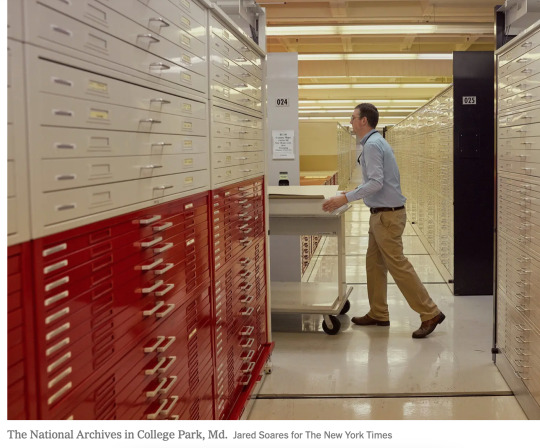
Anna Kelly, a White House spokeswoman, said on X that the disposal process was standard practice for old courtesy copies of paperwork that were largely backed up on classified computer systems. In an emailed statement, she did not address concerns about the removed records, but said that the president regularly communicated with news outlets and directly with the public and was “leading the most transparent administration in history.”
“He is adding transparency by exposing the vast waste, fraud and abuse across the federal government and restoring accountability to taxpayers,” she said.
The campaign of deletion does more than amplify the administration’s policy priorities — it buries evidence of the alternatives in a MAGA-branded memory hole. Several information experts said that Mr. Trump’s executive orders have authoritarian overtones, reminiscent of when Russia cloned Wikipedia, an online encyclopedia, and stripped it of unflattering material. Information experts and civil rights groups fear that a historical vacuum could jeopardize accountability and breed mistrust, especially in an already hostile political environment for researchers who are trying to fight disinformation.
“There are tectonic plates that are shifting, and it’s a new version of truth that is being portrayed, and that, I think, is the most profound danger we have ever faced as a country,” said Laurence H. Tribe, a constitutional scholar and professor emeritus at Harvard Law School.
Even Utah’s Republican lieutenant governor called on Mr. Trump to “bring back our history” after the first American woman to legally vote was removed from the website for Arlington National Cemetery, along with a section on other notable women (her profileis once again available, but the women’s history section is not). References to transgender people disappeared from the National Park Service’s web page for the Stonewall National Monument.
Mr. Trump is not known as an enthusiast of document preservation: Past employees have described his penchant for ripping up documents and flushing papers down the toilet.
But his administration has surfaced some government data. In March, the National Archives released some 64,000 documentsabout the assassination of President John F. Kennedy, including accounting records that contained the Social Security numbers of dozens of government workers from the late 1970s, some of them still living.
The restructuring effort led by Elon Musk through his Department of Government Efficiency, which had been caught in a series of high-profile errors, tried to delete or obscure the mistakes before reversing course last month and adding more details that fact-checkers could use to confirm its claims about the savings it had achieved from canceling federal grants.
In February, a federal judge ordered the Centers for Disease Control and Prevention and several other health agencies to temporarily restore pages that had been scrubbed on Mr. Trump’s orders. The Defense Department said it would republish pagesabout Jackie Robinson’s military service, the Enola Gay B-29 bomber that dropped the first atomic bomb, the Tuskegee Airmen, the Navajo Code Talkers and others.

The historical record, however, remains under intense pressure and not just from the government.
Mr. Musk has a vendetta against Wikipedia, which the billionaire derided as “Wokepedia” last year. He called the encyclopedia, which is written and edited by volunteers from the general public, “an extension of legacy media propaganda” after an entry described a gesture he had made during Mr. Trump’s recent inauguration as being “compared to a Nazi salute.” Jimmy Wales, a founder of Wikipedia, pushed back on the social media platform X, saying “that’s fact. Every element of it.”
Data Foundation, a think tank, said in a report last month that changes in federal evidence gathering are coinciding with similar shifts in the private data sector. Those include more than 2,000 layoffs and other departures in March and several analysis firms shutting down entirely. A year ago, Google also removed links to cached pages from its search results, stripping away a longtime feature that helped researchers and others track changes on websites.
Resources from the government have become especially important as researchers find themselves limited or cut off from data reserves kept by social media companies, said Samuel Woolley, the disinformation studies chair at the University of Pittsburgh.
“The idea that suddenly we no longer need oversight or access to the information that allows us to conduct oversight is worrying,” he said. “Getting rid of public records and people who study things like influence operations amounts to a kind of censorship by omission.”
Outside the government, many archivists are now rushing to preserve endangered material.
The Data Rescue Project, which launched in February, is cataloging preservation efforts and backed up government data sets. Since 2008, the End of Term Web Archive has conducted ��a comprehensive harvest” of federal government domains and chronicled changes from administration to administration. Initiatives like the Environmental Data & Governance Initiative and the Open Environmental Data Project are storing copies of government climate data.


Another key participant: The Internet Archive, a 28-year-old nonprofit library housed in a stately former Christian Science church in San Francisco. Some 140 workers, mostly engineers, archive more than a billion URLs a day with help from partners such as Cloudflare, WordPress, Reddit and Wikipedia’s parent organization, Wikimedia. The work is funded through donations and web archiving agreements with more than 1,300 schools, museums and libraries.
The Archive has collected more than 700,000 terabytes of archived web pages as one of the partners working on the End of Term project, identifying more than 150,000 government pages that have gone offline since the inauguration.
“What we’re seeing this time around is unprecedented, both in terms of the scope and the scale of the web-based resources that are being taken offline, and material on those pages that is being changed,” said Mark Graham, the director of the Wayback Machine, a digital repository operated through the Internet Archive.
The Archive has faced difficulties in recent years, such as copyright lawsuits from record labels and book publishers seeking hundreds of millions of dollars in damages (the organization had a $28 million budget in 2023). It has also been targeted by cyberattacks.
The Trump administration, however, has not been an obstacle. Mr. Musk has called the archive “awesome” and “a public good that should exist,” even as he complained about “a ton of negative” content that concerned him.
In February, government lawyers argued that the removal of information from the C.D.C. website caused limited harm because the scrubbed pages could still be viewed on the Wayback Machine. A federal judge disagreed, noting that the site does not capture every page, and the ones that are archived do not appear on search engines and can only be found using their original URL.
Mr. Graham, an Air Force veteran who can rattle off URLs from memory, said he has worked seven days a week with few breaks since Mr. Trump took office.
“We’ve seen examples throughout history and all over the world where governments attempt to change culture, change the values of a population by changing and/or restricting access to information,” he said. “I think we still see that to this day.”
2 notes
·
View notes
Text
youtube
Should I feel guilty using AI? Simon Clark
-------------
Pretty great video on AI and sustainability. I think he and I have pretty similar views about it.
I would emphasize again that AI is a tool, and not inherently good or bad. what matters is how we as a society allow it work - what powers it, its applications, and its impact on society - which are largely determined by larger social systems, such as economics and governance. AI would be awesome if we demand that it's operated sustainably and not for certain uses we find unacceptable. but capitalism demands we do it most quickly and cheaply. (similarly, losing our jobs would be great if we didn't live in a capitalist hellscape where loss of job threatens your existence.) (the military threat/opportunity of AI - which wasn't touched on much but is equally important - also creates an arms race for development that, to my mind, again demands oversight.) lastly, capitalism works relentlessly to erode democracy as a way for the elite to amass ever more wealth. If we're going to fix democracy, and then be able to tackle issues like AI and climate change, we need to fix the corrosive influence of capitalism on politics and society. lots of ways to do that. in the us, for starters, I'd love to see wayyyyyyyyyy stricter rules about campaign donations. (e.g. overturn citizens united, for starters).
tl;dr: If you want socially responsible AI, you need socially responsible governments.
2 notes
·
View notes
Text
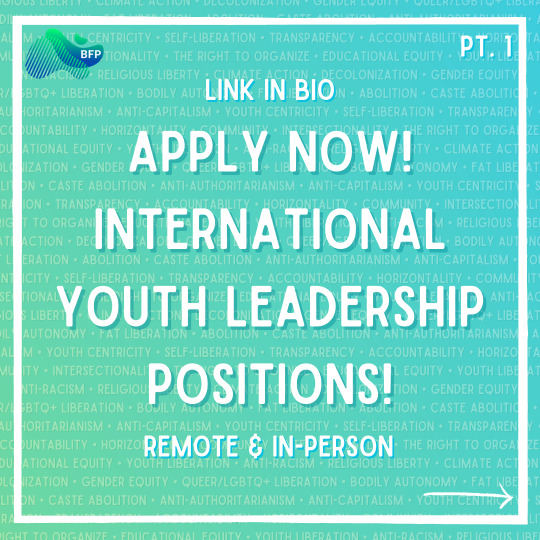

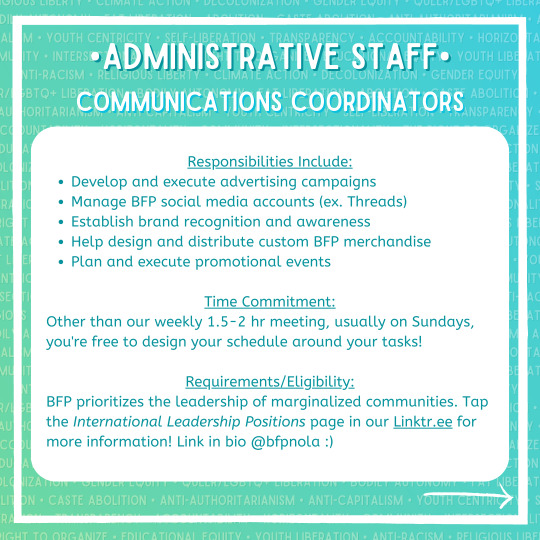
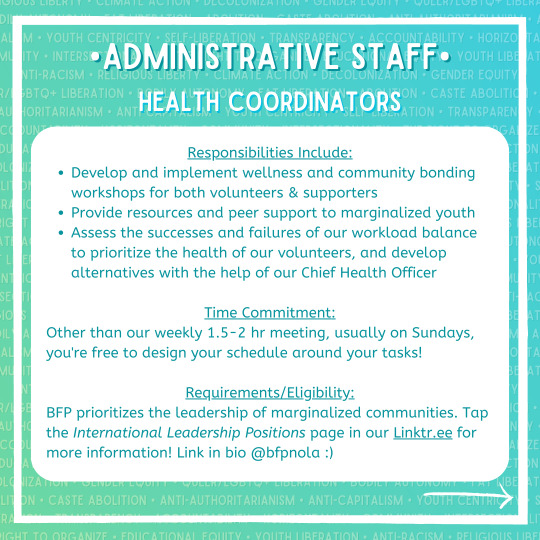
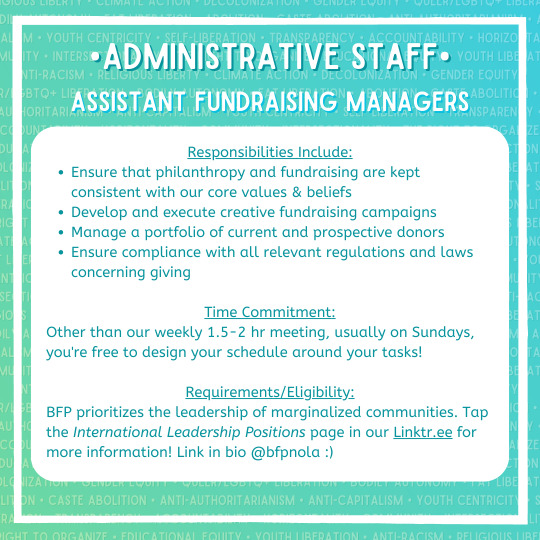
Hey! Better Future Program, Inc. (BFP) is officially looking for youth volunteers between the ages of 14 and 25 for our Administrative Staff! If you don't see a role that fits your interests, don't worry, we've got more positions listed in our Linktree!
And if you don't know who we are? Welcome! BFP is Black-, queer-, and woman-owned nonprofit, entirely run by youth! Since 2016, we've been accepting volunteers not just from Bulbancha (so-called New Orleans, Louisiana), but WORLDWIDE! Our mission is to globally expand peer-led political education, support, and imagination for marginalized youth!
To fulfill this goal, we offer over 3,000 free resources through our Liberation Library, design and execute mutual aid-based projects, and offer the safe space young activists need to ask questions and grow. If this sounds like something you'd be interested in, check out our International Youth Leadership Positions page in our bio!
Image description below.
[ID: All slides share the same background. There is a repeating list of BFP's guiding principles and core beliefs in translucent, all-white, capitalized letters. BFP's guiding principles include youth-centricity, self-liberation, transparency, accountability, horizontality, community, and intersectionality. BFP's core beliefs include the right to organize, educational equity, youth liberation, anti-racism, religious liberty, disability justice, climate action, decolonization, gender equity, queer/LGBTQ+ liberation, bodily autonomy, fat liberation, abolition, caste abolition, anti-authoritarianism, and anti-capitalism. A lime green to sky blue gradient overlays this list. A bold, white square frames the image with a white arrow pointing right in the bottom right corner.
Slide 1 reads: “LINK IN BIO. APPLY NOW! INTERNATIONAL YOUTH LEADERSHIP POSITIONS! REMOTE & IN-PERSON.” There is a BFP logo in the lefthand corner and the words “Part One” in the righthand corner, as this is the first of multiple posts showcasing open leadership positions.
Slide 2 reads: “Administrative Staff: Executive Assistants.
Responsibilities Include:
Co-facilitate communication and decision-making across volunteer committees
Note-taking during Zoom and Discord meetings on Notion
Interview and evaluate potential BFP applicants
Host virtual orientations for incoming youth volunteers
Time Commitment:
Other than our weekly 1.5-2 hr meeting, usually on Sundays, you're free to design your schedule around your tasks!
Requirements/Eligibility:
BFP prioritizes the leadership of marginalized communities. Tap the International Leadership Positions page in our Linktr.ee for more information! Link in bio @bfpnola :)" Slide 3 reads: "Administrative Staff: Communications Coordinators.
Responsibilities Include:
Develop and execute advertising campaigns
Manage BFP social media accounts (ex. Threads)
Establish brand recognition and awareness
Help design and distribute custom BFP merchandise
Plan and execute promotional events
Time Commitment:
Other than our weekly 1.5-2 hr meeting, usually on Sundays, you're free to design your schedule around your tasks!
Requirements/Eligibility:
BFP prioritizes the leadership of marginalized communities. Tap the International Leadership Positions page in our Linktr.ee for more information! Link in bio @bfpnola :)" Slide 4 reads: "Administrative Staff: Health Coordinators.
Responsibilities Include:
Develop and implement wellness and community bonding workshops for both volunteers & supporters
Provide resources and peer support to marginalized youth
Assess the successes and failures of our workload balance to prioritize the health of our volunteers, and develop alternatives with the help of our Chief Health Officer
Time Commitment:
Other than our weekly 1.5-2 hr meeting, usually on Sundays, you're free to design your schedule around your tasks!
Requirements/Eligibility:
BFP prioritizes the leadership of marginalized communities. Tap the International Leadership Positions page in our Linktr.ee for more information! Link in bio @bfpnola :)" Slide 5 reads: "Administrative Staff: Assistant Fundraising Managers.
Responsibilities Include:
Ensure that philanthropy and fundraising are kept consistent with our core values & beliefs
Develop and execute creative fundraising campaigns
Manage a portfolio of current and prospective donors
Ensure compliance with all relevant regulations and laws concerning giving
Time Commitment:
Other than our weekly 1.5-2 hr meeting, usually on Sundays, you're free to design your schedule around your tasks!
Requirements/Eligibility:
BFP prioritizes the leadership of marginalized communities. Tap the International Leadership Positions page in our Linktr.ee for more information! Link in bio @bfpnola :)"
/End ID.]
#reaux speaks#volunteer#anti capitalism#abolition#mad liberation#bipoc#youth liberation#queer#trans#university#high school#new orleans#international#decolonization#communism#socialism#education#leftist#apply now#hiring
41 notes
·
View notes
Text
by Dion J. Pierre
Amid a burst of antisemitism on college campuses across the US, the Students Supporting Israel (SSI) chapter at Vanderbilt University has been denied membership in the Multicultural Leadership Council (MLC) branch of student government.
According to The Vanderbilt Hustler, the group is the only one to be rejected from this year’s applicant pool, an outcome that SSI president Ryan Bauman said is evidence of febrile opposition to dialogue and coexistence among some segments of the student body. The only Jewish group to be admitted, Jewish Voice for Peace (JVP), is a fringe anti-Israel organization that did not condemn Hamas’ Oct. 7 massacre across southern Israel and has long celebrated terrorism against Israelis.
Among the nine groups to be admitted to the MLC this year were the Taiwanese American Student Association, Vanderbilt Pride Serve, the Vanderbilt Association for South Asian Cuisine, and the Vanderbilt Iranian Student Association. One of the 11 total organizations that applied, Vanderbilt United Mission for Relief and Development, is still awaiting an upcoming vote.
As a requirement of its application, SSI was told to deliver a presentation to the MLC but given only a few minutes to do so. Afterward, the group was cross-examined by the MLC — of which Students for Justice in Palestine is a member organization — about their opinions regarding “genocide” and “apartheid,” an apparent attempt to use the proceeding as a soapbox for anti-Zionist propaganda.
“We told them that we didn’t show up to discuss politics,” Bauman told The Algemeiner during an interview on Tuesday. “We told them we were there to celebrate Israeli culture and further the pro-Israel movement and invited them to have other dialogues at another time. We were then told to leave, and they held a closed session. And as you can see, it resulted in us being rejected by a wide margin.”
Vanderbilt University is not a terrible place to be a Jewish student, Bauman explained, but the persistence of anti-Zionists shaming them about their identities has caused them to feel marooned and misunderstood at a time when they want commiseration between all students affected by the Israeli-Palestinian conflict.
“I really wish that they [the MLC] would reconsider. If they wanted to have hard conversations about their criticisms of Israel, let us join and have those conversations, but they can’t even look me in the eye and say that we have a right to our opinions,” he continued. “It’s awful and immensely sad to see that much obstinance exuding from college students who will become the future leaders of the world.”
Overall, Bauman added, the percentage of Vanderbilt University students who support movements like the boycott, divestment, and sanctions (BDS) campaign against Israel is small. He credited the school for being “the best campus” for Jewish students.
11 notes
·
View notes
Note
Have you read Mary Renault's Alexander series/if you have, do you have thoughts? I've only read the persian boy so far and just started Fire from heaven but I've always heard amazing things about how she wrote them
Hello lovely anon!
I'm going to start off with an apology in advance, because whoops! You've asked me something that's set off my inner ramblings quite happily here (in a good way). So I'm going to roll up my sleeves behind the 'read more' and get overexcited about this.
But just in case, the tl;dr is: yes, I have. And yes, I love the series (with a few caveats):
Let's start when young!Lady was a small, wide-eyed thing, all of 17, who had just lied on her Oxford application form, and said she'd read Arrian's Campaigns of Alexander. Then she got called for interview and thought 'Oh shit, I'd better actually read it'. So she did. And she loved it. And she kind of... ended up developing a little obsession with this bloke called Alexander.
Now, around the same time as this deceit was taking place, Robin Lane Fox's biography on Alexander was fairly accessible in most book stores. Possibly because it's really quite a readable biography, and thus had become quite popular. And so young!Lady snaffled that too, and read it. And Lane Fox's name kept coming up in conjunction with Mary Renault's (perhaps because - personally speaking - I think they have a fairly similar approach in their views on Alexander), and so young!Lady thought 'Hey! Let's read those books too!'
All of which, is a very long-winded way of saying: I read them, and I loved them at the time. (To be fair, I still love them. Hephaistion my beloved.) Renault's style of writing is gorgeous. I know for some people it can be off-putting, and a little difficult to parse (she's not what I call a 'light read' in that sense), but I genuinely love the way she constructs her prose.
She was also, I think, one of the first fictional writers to actively and openly tackle an explicit romantic relationship between Alexander and Hephaistion (most prominent in Fire from Heaven, but it's definitely still there in The Persian Boy), and although Hephaistion-as-a-concept had been kicking around before then, I think Renault made the relationship (and Hephaistion) more... mainstream, if I can put it like that?
Renault's historical research is also good. She does give a really interesting flavour of what it must have felt like to live in a Macedonian court, filled with intrigue and the kind of political machinations that resulted in heads rolling. She captures that dangerous, desperate element very well, and she makes Macedonian life accessible to a reader in a way I very much enjoy.
I think as I've got older, where my love for Renault's version has become a little tarnished is in my own inability to put aside my mental nitpickings (and this is no fault of Renault's writing!). Her Alexander trilogy writes about Alexander-the-Legend, not Alexander-the-Man. For me, there is very little balance to be had from her, and although this was a stylistic choice, I do find myself missing the nuance of an Alexander who is not, well, pretty much a perfect example of a living god. He's almost Achillean in the way Renault portrays him - far beyond us brief mortals! - and in some ways that makes his fictional character feel more inaccessible to me. Her Alexander is untouchable. Unknowable. Godlike in his abilities and driven by ambitions far beyond anything a non-heroic mortal can comprehend.
I also feel that Renault's portrayal (understandably) is a bit wrapped up in W.W. Tarn's vision of Alexander as some kind of benevolent conqueror (he wasn't), whose life's exploits were geared towards the betterment of mankind (they weren't). I need to add: this isn't a criticism of Renault! Tarn's scholarship and ideology was very prevalent for quite a while (see: Robin Lane Fox, who sort of subscribed to a viewpoint of Alexander along vaguely similar lines, I think).
My other gentle nitpick, is that very often Renault's women are stereotypes. Or caricatures. Olympias comes across as a vengeful harpy (interestingly, I think there is a lot or Renault's Olympias in Oliver Stone's film version). Again, I think it's fair to defend Renault with the fact that she's working with historical sources that can have the same biases - but even so, for me it's not particularly satisfying.
In the same vein...
Hephiastion my beloved. He does suffer from this too, I think. He's very much in the style of an 'Alexander-can-do-no-wrong' kind of character, and although that does fit the narrative purpose, it simultaneously makes me a little sad that we don't particularly get to see an active, competent Hephaistion in the way I personally feel he likely was. He's not completely reduced to the role of 'the boyfriend', but he is completely defined by Alexander - his behaviour, his impulses, his career are all attributed more to being 'philalexandros', than to any genuinely displayed individualistic motives. Again, it's not a bad thing, but for my Hephaistion-loving gremlin heart it can be dissatisfying if I don't turn off that portion of my brain a bit.
All of which is my very rambling way of saying: yes, I've read Renault's Alexandriad, and yes I genuinely do love those books - for what they represent, for what they do and just for the sheer joy of reading them. But I do have some slight quibbles. None of which are enough to put me off of them, only to say that I think as a reader I have to temper my expectations and meet the books where they are (for what they are). They are beautifully written, and I do think they do something rather unique for the Alexander mythos.
One other book I'd recommend - purely for the sheer delight of it - is Aubrey Menen's A Conspiracy of Women. Written around the same time, it's very different and deals primarily with a moment in time during Alexander's campaigns. It is a satire (not particularly historically motivated), and it pokes fun at quite literally everyone. Whilst not at all romantic in (either sense of the word) the way Renault's writing is, I do love the fact it takes aim at Alexander, and the Alexander mythos (along with a more generally satirical approach to the concept of empire building).
I also love Menen's Hephaistion, who is possibly the driest, wittiest takes-no-nonsense-from Alexander character:
Few men could face an angry Alexander and remain in control of themselves. But one of these was Hephaestion. He glanced at his friend the King, smiled and then said, "Alexander, if you continue to glare that way, the poor man will die of fright. Bathyllus," he said, "for the moment only His Majesty may wear Persian robes. Maybe one day we shall all do so. But His Majesty has not yet made up his mind on the subject."
This being the exact truth, it made Alexander angrier than ever, as Hephaestion knew it would, but with him and not with the unfortunate Bathyllus. Alexander turned his back on Hephaestion. "See that he is brought to my tent," he said, and strode away.
"See that you bring yourself to His Majesty's tent," said Hephaestion to Bathyllus. "I am in no mood for his imperial tantrums this evening..." (pg.19)
Or:
"Hephaestion," he said, "am I really as vain as you say?"
"Did I say you were vain?"
"You said I was in love with myself. Just now. When I boxed your ears."
"Ah," said Hephaestion. "Yes. You are."
"You must tell me when I get vain."
"I do," said Hephaestion.
"Yes, you do," said Alexander. "And I am grateful."
"You are usually remarkably cross," said Hephaestion. "But I shall go on telling you."
"It's strange," said Alexander. "We have conquered a world together, but our friendship is as strong as ever."
Hephaestion made no answer.
"You must find me very hard to bear sometimes, Hephaestion."
"Sometimes," agreed Hephaestion.
"When?" asked Alexander.
"When, for instance, you say things like 'We have conquered a world together, but our friendship is as strong as ever'." Hephaestion echoed exactly the touch of pomposity that Alexander had put into his voice.
Alexander smiled. He reached out and put a hand on Hephaestion's shoulder as they rode together." (pg. 101)
Hephaistion my beloved.
#lady replies#perils of a classicist in modern life#sometimes Lady is a Classicist#this reply could be ten times longer#I have a lot to say about Alexander in fiction#and it shows#alas I do not have the time to do a deep dive into all the things I'd love to reflect on at the moment
12 notes
·
View notes
Text
Vietnam Relied on Environmentalists to Secure Billions. Then It Jailed Them.
The government is preparing to present its energy transition plan at the U.N. climate talks as it intensifies a crackdown on environmental advocates.

(Solar panels at the Sao Mai power plant in An Giang Province, Vietnam, last year. The country has been awarded $15.5 billion in grants and loans in exchange for a commitment to renewable energy)
By Sui-Lee Wee Nov. 28, 2023, 5:01 a.m. ET
When Vietnam was awarded a multibillion-dollar deal by a group of nine wealthy nations last year to work on reducing its use of coal, it agreed to regularly consult with nongovernmental organizations.
Instead, the government has arrested several prominent environmentalists from those organizations who shaped policies that helped secure the funding, prompting concerns over sending money to countries that have violated human rights.
As the country prepares to announce how it will spend the money at the United Nations climate talks that begin on Thursday, activists are saying that Vietnamese officials need to be held accountable for what they are calling a harsh crackdown against those who speak out about the country’s environmental woes.
Ngo Thi To Nhien, the director of an energy think tank, was the sixth environmental campaigner to be detained in the past two years.
She had met with officials from the Ministry of Natural Resources and Environment in March to discuss a plan for the climate deal, the Just Energy Transition Partnership, an effort among the United States, Japan and other developed countries to persuade developing economies to abandon coal. The nine nations had announced in December that Vietnam would receive $15.5 billion in grants and loans in exchange for a commitment to renewable energy.
Ms. Nhien, 48, never got the chance to see Vietnam present the plan. She was arrested in September and remains in a detention center on a charge of “appropriating documents of agencies and organizations.”
The other five who were detained were charged with tax evasion, which rights groups say are trumped-up accusations in response to their advocacy. Four were tried in closed hearings that lasted less than a day each, and given jail time, punishments more severe than the norm. While two activists have since been released, the United Nations high commissioner for human rights said in September that the “prosecutions and the arbitrary application of restrictive legislation are having a chilling effect” on environmentalists in Vietnam.
Activists and academics say that Vietnam appears to be emboldened by its growing importance to the West and has taken the opportunity to clamp down, knowing there will be few repercussions. The country has presented itself as an increasingly important geopolitical player, and one of the few Southeast Asian nations that has publicly pushed back against China. President Biden visited Vietnam in September, elevating ties to a new strategic relationship that he said would ��be a force for prosperity and security in one of the most consequential regions in the world.”
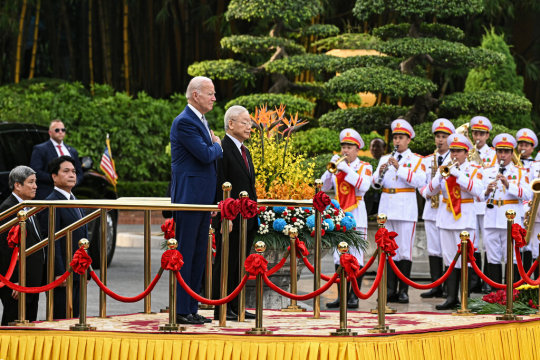
(President Biden and Nguyen Phu Trong, the general secretary of the Communist Party of Vietnam, at a welcome ceremony in Hanoi in September)
“We’re dealing with a juggernaut,” said Phil Robertson, the deputy director of Human Rights Watch’s Asia division. “They have run the table on the international community, and they’re continuing to do so.”
He pointed to Vietnam’s invitation to the Group of 7 summit this year, its inclusion on the Human Rights Council and now the funding from the Just Energy Transition Partnership, despite the country’s troubling human rights record.
Since 2016, when Nguyen Phu Trong, the general secretary of the Communist Party of Vietnam, was re-elected, the space for civil society has shrunk immensely. The country has the second-highest number of political prisoners in Southeast Asia, with more than 160 people currently detained for exercising their basic rights, according to Human Rights Watch.
The authorities in Vietnam have long persecuted people who are viewed as overt threats to one-party rule. But Mr. Trong’s administration has gone much further, targeting people who were previously given some room to operate.
Vietnam rejects any suggestions that the prosecutions are politically motivated. Pham Thu Hang, a spokeswoman for the Vietnamese foreign ministry, said last month that the environmentalists’ cases were “investigated, prosecuted and tried in accordance with the provisions of Vietnam law.”

(An electric vehicle charging station in a Hanoi parking garage. Nine wealthy nations announced in December that Vietnam would be the recipient of funding to facilitate its energy transition)
All six ran organizations that were outspoken about the country's environmental problems. That advocacy ultimately put them on a collision course with the Communist Party.
Their detentions are a signal that the government wants the energy transition to be carried out on its own terms and not on the advice of groups they have long deemed suspicious, said Nguyen Khac Giang, a visiting fellow at the ISEAS-Yusof Ishak Institute, a research organization in Singapore.
On the day Ms. Nhien was detained, Nhan Dan, the official newspaper of the Communist Party, criticized foreign donors who had funded policy research, saying they had directed groups to publish reports with “one-sided, negative content, tarnishing the situation of the country and the people of Vietnam.”
Vietnam, a manufacturing powerhouse that is home to nearly 99.5 million people, is the ninth-largest coal consumer globally. In 2021, Prime Minister Pham Minh Chinh vowed that the country would phase out coal consumption by 2040.

(A coal company in Quang Ninh Province, in northeast Vietnam. The country is the ninth-largest coal consumer globally)
The Just Energy Transition Partnership was first awarded to South Africa in 2021 as part of an effort by wealthy countries to address longstanding inequities in tackling climate change. Activists now see Vietnam as a litmus test for future agreements. Should other repressive governments be given billions of dollars? Should there be specific requirements for countries that receive funding but have poor human rights records?
Several countries behind the climate deal have expressed concern about the detentions in Vietnam, but rights groups say those nations need to predicate their financial support on the release of the environmentalists or a pledge from the government that there will not be additional arrests. So far, the countries have been unwilling to do so, said Ben Swanton, a director at The 88 Project, a U.S.-based nonprofit that focuses on human rights issues in Vietnam.

(Dang Dinh Bach, 45, ran a law and policy research center before he was arrested in 2021.)
In one of the harshest penalties in Vietnam for someone convicted of tax evasion, Dang Dinh Bach, 45, was given a five-year sentence in January 2022. He ran a law and sustainable development policy research center that provided legal aid to communities.
Mr. Bach refused to plead guilty. Tran Phuong Thao, his wife, said that she was not allowed to attend his trial and that he has been assaulted in prison by police officers.
“People like my husband have made great efforts to support the government and give suggestions on energy transition policies,” Ms. Thao said.
The arrest of Ms. Nhien, the think tank director, was particularly unusual because she was not a government critic. She led the Vietnam Initiative for Energy Transition Social Enterprise, the first group in the country to specialize in energy transition.
A former civil servant, Ms. Nhien had worked as a consultant at the World Bank and the Southeast Asia Energy Transition Partnership, a program managed by a U.N. infrastructure agency. She championed policymaking based on scientific evidence and was invited in May to speak to the Ministry of Science and Technology of Vietnam. In June 2020, she organized a workshop on integrating renewable energy sources into the country’s grid, presenting information from the state electricity utility.
That was enough to make her a target. On Sept. 15, four days after Mr. Biden left Vietnam, she was detained. The Ministry of Public Security pointed to the workshop as evidence of her “appropriating internal documents.”
Two weeks later, a court in Ho Chi Minh City sentenced Hoang Thi Minh Hong, 51, one of Vietnam’s best-known environmentalists, to three years in prison for tax evasion.

(Hoang Thi Minh Hong, one of Vietnam’s best-known environmentalists, was sentenced to three years in prison for tax evasion)
Ms. Hong’s husband, Hoang Vinh Nam, called his wife’s trial a sham and said the tax department did not send anyone to testify against her. When her peers started being arrested two years ago, Ms. Hong called the tax bureau to ask whether she owed anything and was assured that she did not, he said.
In December, Ms. Hong decided to shut down her environmental nonprofit, citing government pressures. She was arrested in May.
12 notes
·
View notes
Text
Generative AI Copyright Disclosure Act
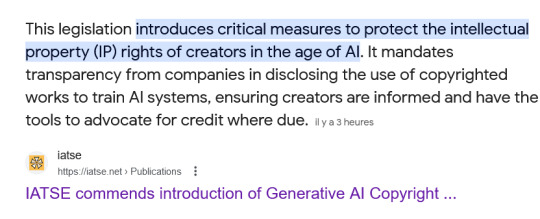
Representative Adam Schiff (D-CA) introduced the Generative AI Copyright Disclosure Act, a bill to establish transparency with respect to copyrighted works used in building generative artificial intelligence (AI) systems, Tuesday.
The International Alliance of Theatrical Stage Employees (IATSE) is proud to endorse the Generative AI Copyright Disclosure Act – we thank Rep. Schiff for his leadership on this critical issue and for his partnership, inviting the input of IATSE behind-the-scenes entertainment workers in the drafting of this bill.
Speaking in support of the newly introduced federal legislation, International President Matthew D. Loeb said, “IATSE commends Rep. Adam Schiff for introducing the Generative AI Copyright Disclosure Act. Entertainment workers must have consent over the implementation of emerging technologies in their workplaces and must be fairly compensated when their work is used to train, develop or generate new works by AI systems. This legislation will ensure there is appropriate transparency of generative AI training sets, and would empower IATSE workers to enforce their rights.”
The rapid development of generative AI technologies has outpaced existing law, leading to widespread use of creative content without consent or compensation. This legislation introduces critical measures to protect the intellectual property (IP) rights of creators in the age of AI. It mandates transparency from companies in disclosing the use of copyrighted works to train AI systems, ensuring creators are informed and have the tools to advocate for credit where due.
Maintaining strong copyright and IP laws, and prioritizing the people involved in the creative process, is the primary focus of IATSE’s AI-related political and legislative advocacy. As highlighted in the Agenda des questions fédérales de l'IATSE, absent safeguards to ensure consent, compensation, and credit for the use of copyrighted works and IP, and appropriate transparency of training sets, AI will continue to be used as a sophisticated, deceptive tool for content theft.
“AI developers cannot be allowed to circumvent established U.S. copyright law and commit intellectual property theft by scraping the internet for copyrighted works to train their models without permission from rightsholders. The theft of copyrighted works – domestically and internationally – threatens our hard-won health care benefits and retirement security,” said International Vice President Vanessa Holtgrewe in November at the bipartisan U.S. Senate AI Insight Forum on IP and copyright.
We must improve transparency of generative AI training data sets to protect the rights of working people who power the U.S. entertainment industry. The Generative AI Copyright Disclosure Act will do just that. We look forward to continued collaboration with Rep. Schiff to advance this effort and we urge all members of the House of Representatives to cosponsor this important legislation.
Political and legislative advocacy around artificial intelligence and machine learning are part of IATSE’s broad campaign to address the impact of emerging technologies on entertainment workers. Click here to read IATSE’s Core Principles for Addressing Applications of Artificial Intelligence and Machine Learning Technology.
# # #
L'International Alliance of Theatrical Stage Employees ou IATSE (nom complet : International Alliance of Theatrical Stage Employees, Moving Picture Technicians, Artists and Allied Crafts of the United States, Its Territories and Canada) est un syndicat représentant plus de 170 000 techniciens, artisans et ouvriers de l'industrie du spectacle, y compris les événements en direct, la production cinématographique et télévisuelle, la radiodiffusion et les salons professionnels aux États-Unis et au Canada.
4 notes
·
View notes